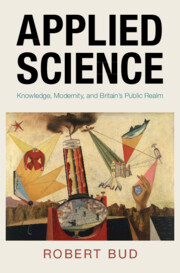Book contents
- Applied Science
- Science in History
- Applied Science
- Copyright page
- Dedication
- Contents
- Figures
- Acknowledgements
- Introduction
- Stage 1 Origins and Pedagogy in the Nineteenth Century
- Stage 2 Research in the Early Twentieth Century
- Stage 3 After World War Two
- 7 Co-existence through Growth
- 8 From Applied Science to Technological Innovation
- Conclusion
- Archives Used
- References
- Index
Conclusion
from Stage 3 - After World War Two
Published online by Cambridge University Press: 15 March 2024
- Applied Science
- Science in History
- Applied Science
- Copyright page
- Dedication
- Contents
- Figures
- Acknowledgements
- Introduction
- Stage 1 Origins and Pedagogy in the Nineteenth Century
- Stage 2 Research in the Early Twentieth Century
- Stage 3 After World War Two
- 7 Co-existence through Growth
- 8 From Applied Science to Technological Innovation
- Conclusion
- Archives Used
- References
- Index
Summary
Government policies, stories, and institutions lie at the heart of the argument. Widely embodying the term ‘applied science’, they made it visible and real. They have also been sites of interplay between organisational and professional promotion and public discourse about Britain’s prospects. Summarising the book, this chapter reflects on the continuity between the nineteenth-century emphasis on pedagogy and the twentieth-century focus on research. It suggests that because the meaning of applied science is rooted in national debate and experience, it differed from terms growing out of other national experiences, such as the German Technik. Its trajectory in other English-speaking countries should also be studied individually. The imperial experience meant the term may have been transformed as it travelled. In sum, its meaning was not the work of just a few intellectuals. Instead, the character of applied science developed through the complexities of history and widespread public debate.
Keywords
- Type
- Chapter
- Information
- Applied ScienceKnowledge, Modernity, and Britain's Public Realm, pp. 255 - 262Publisher: Cambridge University PressPrint publication year: 2024

